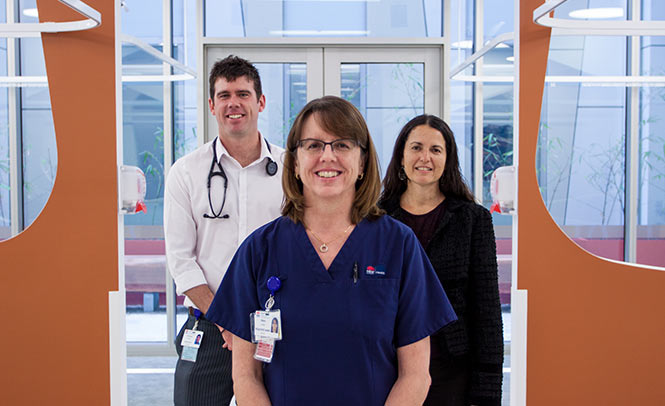Coming to Hospital

There are several ways you may be admitted to hospital, such as through the Emergency Department, as a day-only admission or for a complex surgical procedure which may require overnight stay.
Find out more about coming to hospital, and your admission choices
You can also request to get an interpreter or access multicultural health services to help you while in hospital.
For patients who are preparing for surgery, please review the information about Patient Blood Management.
While in hospital, patients and their carers can use the REACH program to alert staff of any worrying change in their condition. Find out more about REACH.
All hospitals and health facilities in Northern NSW Local Health District are smoke-free. To find out how we can support you to stop smoking or manage your tobacco use, check out our QUIT services.
Getting admitted
When you are seriously sick or injured you may be immediately admitted to hospital through an emergency department. This is called an emergency admission. For more information about emergency admission, see Emergency departments.
You may also be admitted to hospital when your doctor refers you to a specialist doctor and the specialist recommends you be admitted to hospital. This is known as a booked admission.
To arrange a booked admission, your specialist will complete a recommendation for admission form, indicating how urgently your admission is required. Sometimes the specialist will deliver the form to the hospital and sometimes you will be asked to deliver it.
You must give your informed consent before you have a procedure. For suggested questions you could ask, see Questions to ask your doctor or specialist.
Your admission choices
If you have a Medicare card you can generally choose to be treated as a public or a private patient. To help you make an informed admission choice, read Your Stay in Hospital, Your Choices.
If you choose to be admitted as a public patient:
- you will be treated by doctors nominated by the hospital
- you will not be charged for hospital accommodation, medical and diagnostic services, prostheses or other relevant services
- your follow-up care when you leave hospital will usually be provided in an outpatient clinic of the hospital.
If you choose to be admitted as a private patient:
- you can choose the specialist doctor who will treat you
- you will be informed prior to making a choice, whether there will be any out-of-pocket expenses for hospital-generated accounts or doctor(s) fees
- your specialist doctor will usually provide follow-up care in their private room after you leave hospital. As a private patient you may also be eligible to transfer to a private hospital for further treatment or for follow-up care.
- you will have access to a single room if one is available and you have single room health cover.
For more information on the benefits of choosing to be a private patient read What it Means to be a Private Patient.
Preparing for admission
Before going to hospital for your surgery, you may attend a pre-admission clinic where staff will provide you with information about the surgery and make plans for after the surgery.
You may require admission before the day planned for the surgery if your doctor needs to do further tests before the surgery, or to prepare you for surgery.
Day only admission
Day only admission is when you are admitted to hospital, have the surgery and go home on the same day. Day only admission causes less disruption to your normal activities and also reduces the chance of post-operative infections and blood clots.
Day of surgery admission
Day of surgery admission means that you are admitted to hospital and have the surgery on the same day, but you stay in hospital after the operation, at least overnight.
In all of these cases, your doctor will let you know the arrangements for your admission to hospital.
During your stay
While you are in hospital you may be referred to an allied health professional to assist you in your recovery. Services provided by allied health professionals include physiotherapy, speech pathology, occupational therapy, social work, podiatry, radiology, audiology, nutrition and orthoptics.
If you have any questions regarding your treatment while you are in hospital, do not hesitate to ask the hospital staff.
For more information about what you can expect from your time in hospital, see Planning Your Hospital Stay and Patient care, treatment and concerns. Further information on 'Going to a Different Hospital while you recover'.
What to wear while in hospital
During your hospital stay, please wear whatever clothing you feel most comfortable in. This may be loose fitting clothing, pyjamas or a dressing gown.
We encourage you to bring your own safe, flat, well-fitting shoes and wear these when walking around the hospital.
While you may be familiar with seeing patients wearing red non-slip socks in the hospital setting, these are not appropriate footwear and are not a substitute for your own shoes.
The red non-slip socks are being phased out, in favour of patients wearing their existing footwear.
Getting an interpreter
If English is not your first language and you are having difficulty understanding your doctor or any of the other professional staff caring for you, you can request a health care interpreter. For more information, see Health care interpreting and translating services.